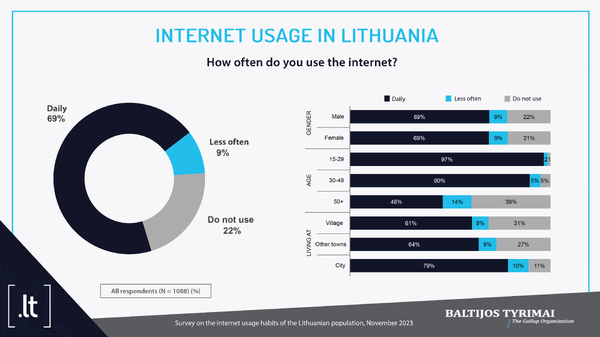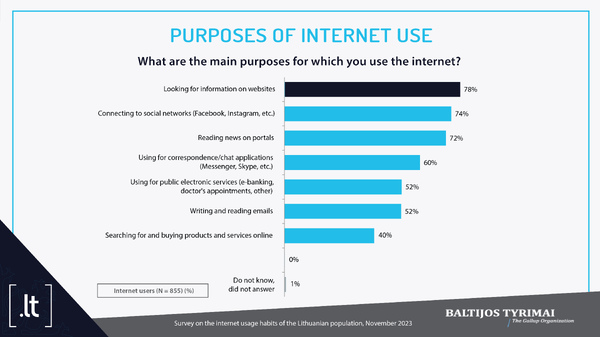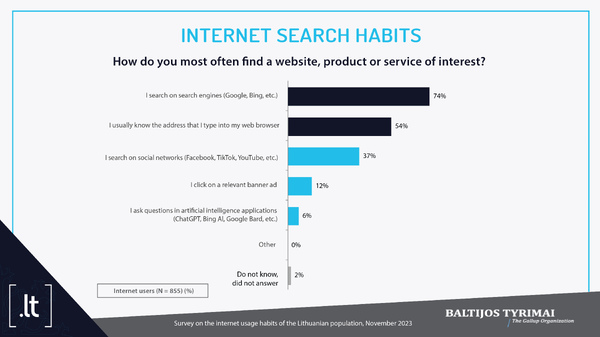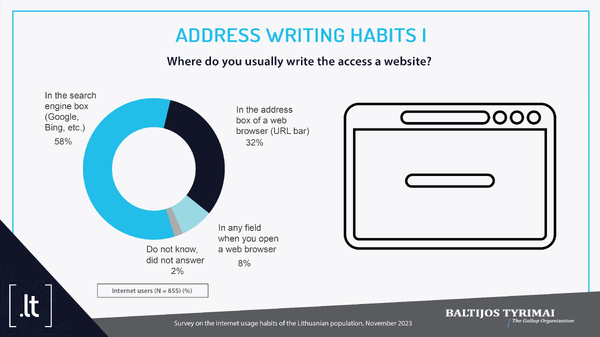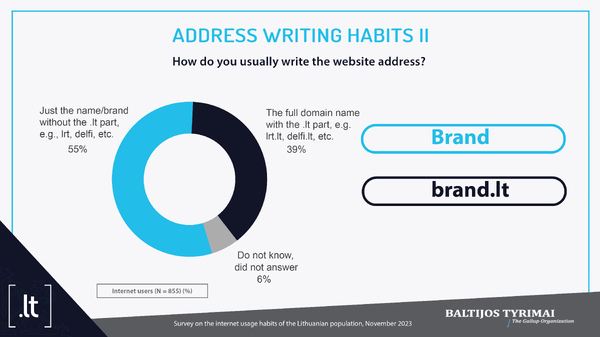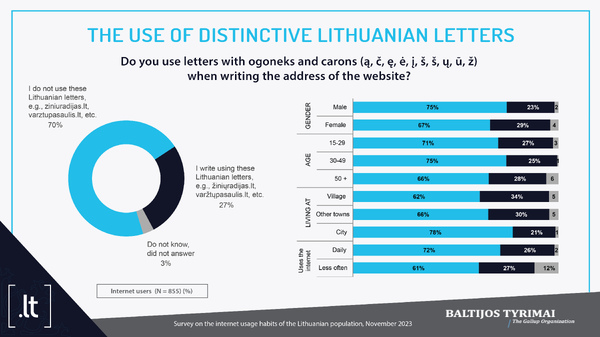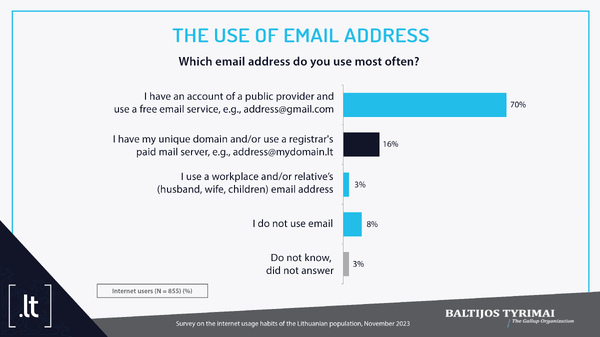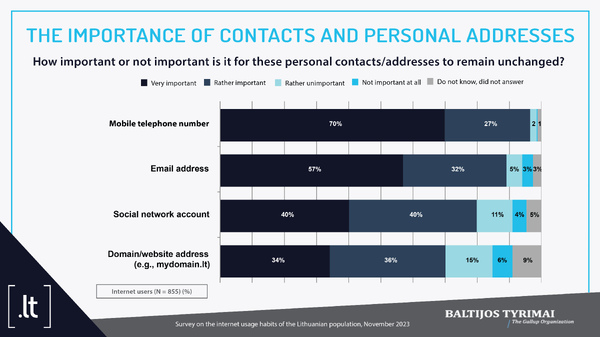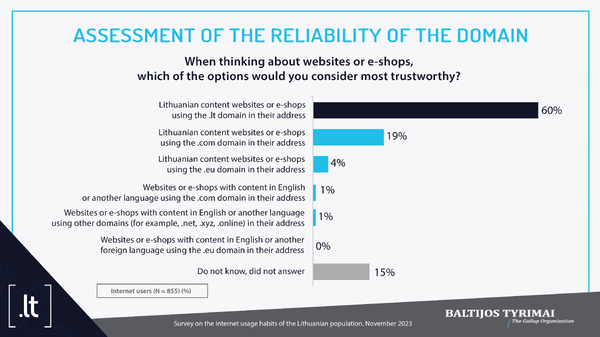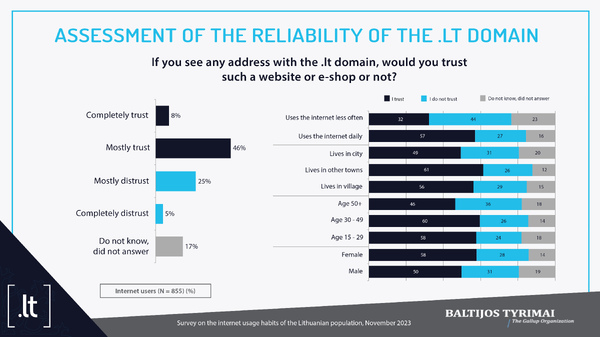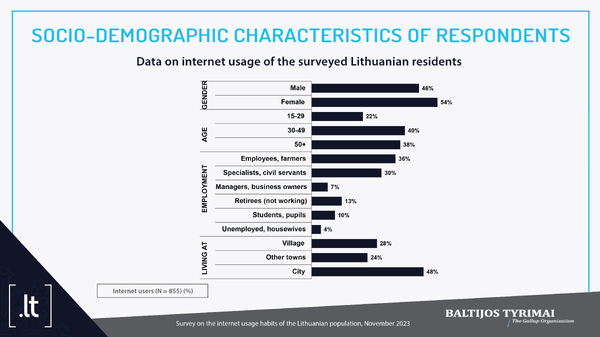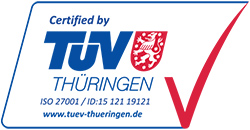Check .lt domain
Survey on internet usage habits: seniors avoid it, young people google and use incorrect spelling in domain names
As many as 39% of Lithuanians who are older than 50 do not use the internet at all, and the most common purposes for using the internet among Lithuanians are searching for information on websites, connecting to social networks and reading news on portals.
More than half of Lithuanians know the domain address when they want to access content online, but 70% of people in our country spell domain names incorrectly, without the use of specific Lithuanian characters. This was revealed when the public opinion and market survey company “Baltijos Tyrimai” conducted a survey of Lithuanian residents on their habits of internet use, ordered by the Internet Service Centre DOMREG at Kaunas University of Technology, in November 2023.
Although AI-based products are growing in popularity, only 6% of Lithuanians use the AI applications (ChatGPT, Bing AI - Copilot, Google Bard - Gemini, etc.) to search for information. Social networks (Facebook, TikTok, YouTube, etc.) are used by 37% of respondents and the vast majority of respondents - 74% - use internet search engines (Google, Bing, etc.) to find information.
Google is the first source of information
Tomas Mackus, Head of the Internet Services Centre DOMREG at Kaunas University of Technology (KTU), is not surprised that more people look for information first in internet search engines instead of social networks or AI applications. Moreover, people tend to visit familiar websites or e-shops directly by typing the domain name into a web browser.
“Social networks are for sharing life changes, experiences or thoughts with friends. It is a snapshot or a reflection of a particular day. Websites are for publishing structured information and presenting a business. This is perhaps the key difference between websites and social networks.
Considering that more than half of Lithuanians know the domain and access the website by typing it into a browser, we should look at how we behave in real life. If we know where we can find a product in a supermarket, we go straight there. We act the same way online: if we know the domain, we type it into the address field of our web browser and access the e-shop. If we do not know, then we search on search engines. So, a domain is very important – it is like an address that is helpful for a quick search.
When considering why people have not yet gotten used to using AI-based chatbots, the fact that the free version of ChatGPT is not based on the most up-to-date sources should be taken into account. We are always interested in what is currently available when looking for a particular product or service. I think AI bots will grow in popularity; however, they will not replace internet search engines, but will complement each other,” – predicts T. Mackus.
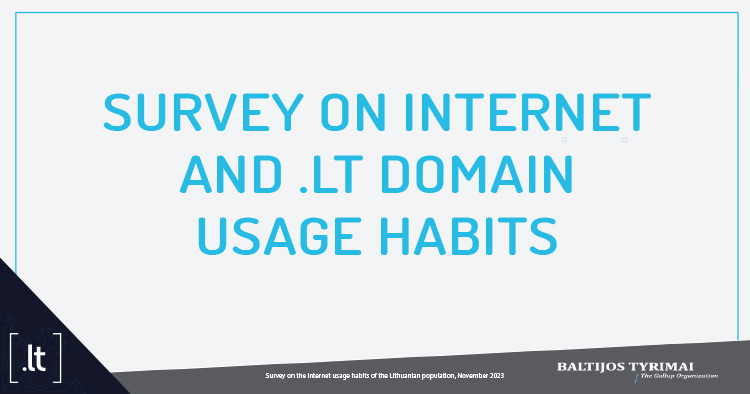
Seniors suffer from the digital divide
Although young people under 29 years of age are very active users of the internet in Lithuania, with 97% of young people connecting to the internet every day and only 1% not using the internet at all, the number of people over 50 who do not use the internet at all amounts to 39%, while another 14% of this age group use the internet less frequently, as revealed by a survey conducted by “Baltijos Tyrimai”. Internet use in rural areas and district centres is also lower than in Lithuania’s major cities.
According to Tomas Mackus, Head of KTU Internet Service Centre DOMREG, the low computer literacy and internet use of seniors limit their abilities to communicate with their relatives and access information or e-services.
“The problem of the digital divide is particularly acute because many services are being digitised and businesses want to move away from human manual labour and provide automated services to save costs. However, some people did not use the internet when they were young as well as have not used it for most of their lives, and are now finding it difficult to adapt to it. It is good if an elderly person has children who can help. Seniors have a particularly difficult time when it comes to sensitive things, like using e-banking services. Because if you do not understand how it works, you will surely not use it and will not feel comfortable,” – says T. Mackus.
According to the respondent, artificial intelligence could help reduce the digital divide among seniors by making it easier for seniors to interact with systems, use human language and get the information they need. Greater efforts to teach seniors computer literacy would also improve the situation.
“Some seniors are particularly active, have a lot of unique life experiences they would like to share, they write memoirs and books, and are interested in handicrafts. It is particularly gratifying when retired people are actively participating in social initiatives and various cultural events. Seniors form communities, register domains and create websites to preserve the history and customs of their region and present historical sites. I believe that more personal websites presenting interesting life stories will emerge. After all, you can register a domain and create a website without any programming knowledge, you just need a little more computer literacy,” – notes T. Mackus.

Tomas Mackus, Head of KTU Internet Service Centre
The habit of incorrect spelling remains
Another problem revealed by the survey of Lithuanian residents on their habits of internet use conducted by “Baltijos Tyrimai” is incorrect spelling. When asked whether they use letters with ogoneks and carons (ą, č, ę, ė, į, š, ų, ū, ž) to write their website address, 70% of respondents indicated that they avoid these Lithuanian letters, and only 27% spell their domain names correctly, e.g., gražus-vardas.lt.
According to the survey, Lithuanians living in rural areas (34%) and district centres (30%) are more likely to spell domain names correctly, while those living in big cities (21%) are much less likely to do so.
Vaidotas Jakuška, Head of the Localisation Section of the Lithuanian Computer Society and Marketing and Communication Specialist at KTU Internet Service Centre DOMREG, believes that the habit of incorrect spelling is persistent due to the still insufficient development of the infrastructure of internationalised domain names (IDN) and the bad habit in user behaviour that has been formed, which is changing too slowly.
“Although the technical possibilities to register .lt domain names with diacritical marks was made available in 2004, the past 20 years have not seen the development of an IDN domain-friendly infrastructure across the board: not all software (web browsers, email applications, etc.) and other information systems are adapted. As a result, those wishing to use a correct Lithuanian domain name face the inconvenience of being forced to transcode the correct domain name into a punycode that is understood by the servers and the user’s software, i.e., instead of gražus-vardas.lt, they have to write xn–graus-vardas-pyc.lt and see the same name in social networks, some web browsers and some information systems. Obviously, this inconvenience discourages the use of such domains and forces the continuation of the bad habit of incorrect spelling,” – says V. Jakuška.
According to the respondent, the same individual should create domains with distinctive Lithuanian characters in parallel to their incorrectly spelled equivalents to provide better protection for the domain, avoiding confusion and disputes over the confusing similarity of domain names to another person’s domain simply because of similar spelling. Although it is still difficult to use such domains fully, it is possible to forward them to an incorrectly spelled equivalent.
“While websites such as kupolė.lt and kupole.lt are clearly different and do not mislead the consumer, websites such as vėdinimas.lt and vedinimas.lt, svarstyklės.lt and svartykles.lt, bitėms.lt and bitems.lt are the websites presenting the same or a very similar business, and can therefore mislead the consumer. As indicated by the survey data, almost one-third of domain names are spelled correctly; therefore, not having an IDN domain can significantly reduce website traffic and advertising effectiveness,” – warns Marketing and Communication Specialist V. Jakuška.

Vaidotas Jakuška, Head of the Localisation Section of the Lithuanian Computer Society, Marketing and Communication Specialist at KTU Internet Service Centre
Do not know the difference between a domain and a trademark
In a survey of Lithuanian residents about their internet usage habits, respondents were asked where and how they most often write their website address. 58% of Lithuanians say they type the address into an internet search engine (Google, Bing, etc.), another 8% write it in any field when they open a web browser, and only 32% of Lithuanians write the domain name in a dedicated address field of the web browser. As many as 55% of respondents say they only type the brand name to access the website they want to visit, and 39% say they type the entire domain, i.e., the domain name plus the .lt part.
“When registering a domain, it is recommended for the domain name to match the trademark to make it easier to find the website, but often the choice of domain is irrational: trademark owners choose a different domain name and a different top-level domain, especially when the name in their preferred top-level domain is taken. For this reason, a large number of visitors reach the website not by typing in the exact domain name that matches the trademark, but rather by typing the trademark into an internet search engine and receiving the search results. This sometimes leads them to fake websites or those of competitors,” – notes V. Jakuška.
Both businesses and consumers would be safer if they used a domain name matching the trademark to access their websites, and typed the entire domain name into the address field of their web browser. This is especially important for regular visits and when connecting to banking and other sensitive systems.
Telephone number and email are more important to Lithuanians than social media accounts
When assessing the internet usage habits of Lithuanians, it is interesting to know how important it is to have constant, unchanging personal contacts online: mobile telephone number, email address, social network account and domain. 70% of respondents consider the telephone number to be very important, while 27% consider it to be rather important. The email address is considered very important by 57% of Lithuanians, rather important by 32%, rather unimportant by 5% and not important at all by 3%. A social network account is very important for 40% of Lithuanians, rather important for 40%, rather unimportant for 11%, and not important at all for 4%. Domain name is very important for 34% of Lithuanians, rather important for 36%, rather unimportant for 15 and not important at all for 6%.
T. Mackus, Head of the KTU Internet Service Centre DOMREG, is convinced that the telephone number is the most important for Lithuanians, as it is a common means of communication owned by almost everyone.
“Everyone has a telephone, so having a telephone number is very important for everyone. There are slightly fewer email users, so email address is less important. When we think about the importance of email addresses, we should exclude the youngest people, who have no formal communication relationships, are not yet working, and more often use social networks. For seniors, who are out of the labour market and have fewer formal relationships that require the use of email, it is also a less important means of communication than the telephone. Even fewer people have their own domain for personal use – only around 100,000 individuals have registered a .lt domain and not all of them use it. As long as the domain is not linked to email, it is less important. Once you start using an email address linked to a unique domain, the importance of the domain increases,” – explains T. Mackus.
According to the survey data, only 16% of Lithuanians have their own unique domain for their email address and use a paid registrar’s mail server services. The majority of respondents - 70% - have an account with a public registrar and use a free mail service such as address@gmail.com. A small share - 3% - say they use an email address from their workplace or relatives and 8% say they do not use email at all.
“The widely used free email services should be explained by economic logic. The public email provider has been providing this service free of charge for many years, at least without the need for people to pay directly for an email account. However, in this case, the user sacrifices his/her independence from the registrar, who usually collects information about the user and spams advertisements in return for a free mailbox.
The consumer should be aware that if the email service provider changed its terms at any time, the consumer would be forced to change the address of the mailbox or to accept the new terms. Gmail, which is currently the most popular free email service in Lithuania, can become a paid service, as has already happened to some extent with the Facebook social network. Then all the charm of the free service would be lost, and what is worse, it would not be possible to transfer your email address, which uses a domain owned by the registrar instead of the user’s own domain, to another email service provider.
When you use your unique domain, you can transfer your existing email account to another email service provider of your choice whose terms and conditions you consider acceptable. When using a free service, the domain is not yours and the email address does not belong to you,” – T. Mackus identifies the risks.
Survey on the internet usage habits of the Lithuanian population, November 2023 m.
The survey of Lithuanian residents on their internet usage habits, commissioned by KTU Internet Service Centre DOMREG, was conducted in November 2023 by the joint Lithuanian-British market and public opinion research company “Baltijos Tyrimai”. The survey was conducted as part of the Lithuanian National Barometer. A total of 1088 people in Lithuania were interviewed at 109 sampling points. The survey has classified and analysed internet users (855 respondents, representing 78% of the total sample). The survey results reflect the views of Lithuanian internet users aged 15 and over by gender, age, education and type of settlement. The margin of error for a sample of this size does not exceed plus or minus 3.4 %.
Published 2024-05-09
